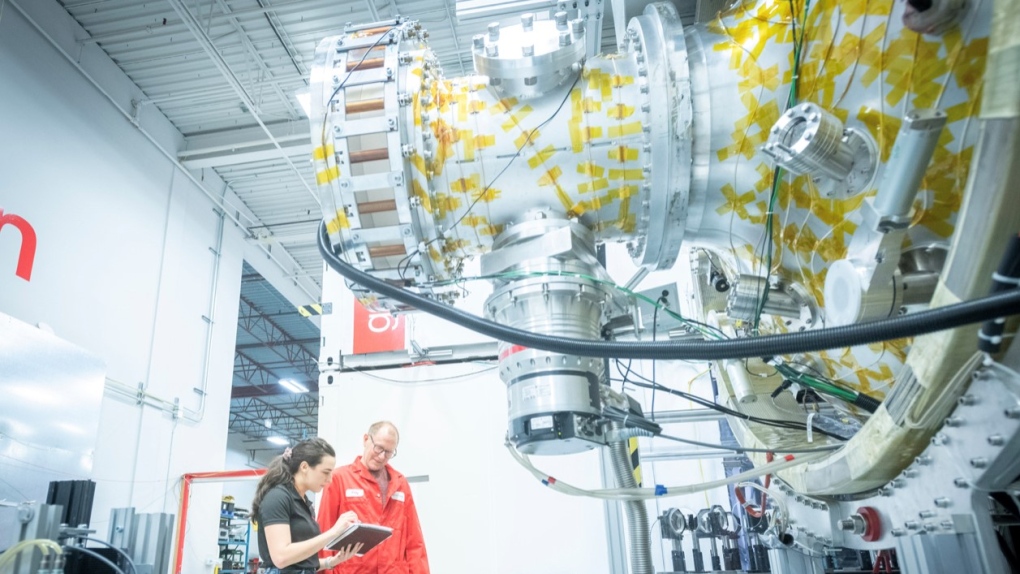Partnership could lead to first fusion power plant in Ontario
 Magnetized target fusion technology is seen in this undated handout photo. (Source: General Fusion)
Magnetized target fusion technology is seen in this undated handout photo. (Source: General Fusion)
The joke in the scientific world is that fusion energy is 20 years away, and always will be. Well, Jay Brister from General Fusion says otherwise.
“I like to tell people fusion is getting much more tangible than it ever has,” says Brister, the chief business development officer with the B.C.-based fusion development company.
General Fusion has joined forces with the Port Elgin, Ont.-based Nuclear Innovation Institute and Ontario’s largest nuclear plant, Bruce Power, to work towards advancing fusion-based electricity and possibly building a fusion power plant in Ontario.
“If there was an area in Ontario that would be a potential candidate for it, the Bruce Power site would be at the top of that list,” says Bruce Power’s Chief Development Officer James Scongack.
Bruce Power’s CANDU reactors harness the powers of 'fission,' splitting one atom into two, to power their nuclear fleet.
'Fusion,' which unleashes the power of combining two atoms into one, has not yet been harnessed commercially to produce electricity, -- until now, says General Fusion.
The company is about to build a fusion demonstration plant in the United Kingdom, with operations to begin in three years' time.
“That will bring us to the point that we’re ready to put a shovel in the ground by the end of this decade on the first fusion power plant, with operations anticipated in the early 2030s,” says Brister.
And if all goes according to plan, that first fusion plant could be built at or near the Bruce Power site.
“A lot of the attributes that we have for a nuclear site would make sense for a fusion site. It’s a secure site, there are utilities, support services, technical staff, not to mention the 60+ clean energy companies that are in the tri-county (Bruce, Grey, Huron) region,” says Scongack.
Hold your horses, says University of British Columbia professor and nuclear power researcher, Dr. M.V. Ramana.
He doesn’t believe fusion energy will be commercially feasible for many, many decades, if ever.
“As of today, no experiment in the the world has actually produced more energy than has been put in, so we are far from even the point where we can contemplate fusion being a source of energy,” he says.
That isn’t dulling the excitement at General Fusion or Bruce Power, who believe fusion energy could be part of the answer to our future carbon-free energy needs.
“To tackle net zero we need massive volumes of clean power, so that allows us to say, 'Let’s put every tool in the tool box on the table to tackle this problem,'” says Scongack.
CTVNews.ca Top Stories

'Summer Olympics': Summer McIntosh wins gold in women's 200 medley
The Toronto swimmer won her third gold in Paris with a victory in the 200-metre individual medley in an Olympic-record time of two minutes 6.56 seconds.
Donald Trump proposes alternative U.S. election debate, Kamala Harris says no
Republican presidential nominee Donald Trump proposed to debate Democratic U.S. Vice President Kamala Harris on Fox News on Sept. 4, and the Harris campaign responded saying Trump is trying to back out of a debate that had been set to run on ABC.
Canada loses on penalties to Germany in Olympic soccer quarterfinal
Canada has lost to Germany in the women's soccer quarterfinal at the Paris Olympics. The match was decided by penalties, ending the Canadians' defence of their Olympic championship.
Canadian cities sweltering in wildfire smoke: Here's what to know
Wildfire smoke is drifting over Canada from the Rockies all the way to the Newfoundland Sea, according to modelling for the August long weekend.
Cut your risk of dementia by 20% with this dietary change
Dementia risk rose by 14 per cent when people ate about one ounce of processed red meat a day — the equivalent of slightly less than two three-ounce servings a week — compared with people who only ate about three servings a month, a preliminary new study found.
Video shows suspects ramming gate at Bridle Path home in broad daylight, stealing Bentley
A family in Toronto’s Bridle Path neighbourhood said their home was targeted by intruders for the second time in two years after suspects were captured on video crashing into a metal gate and stealing a luxury car from the property earlier this week.
Canadians win silver, bronze in Olympic men's 100-metre butterfly
Canada's Josh Liendo has won the silver medal and Ilya Kharun the bronze in the men's 100-metre butterfly at the Paris Olympics.
Mother blasts MPs on House committee for 'disgusting' treatment of her daughter
The mother of a witness who stormed out of a House of Commons committee in tears is berating Liberals, NDP and Conservative members for a 'disgusting' partisan display in a letter she plans to share with MPs.
Moose Jaw teen charged after pointing pellet gun at people: police
An 18-year-old male has been charged in Moose Jaw after police say he pointed a firearm at a group of people on Friday.































